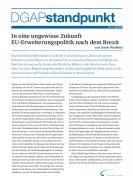Even before the outcome of the Brexit referendum, the Western Balkans and the topic of EU enlargement were hardly top priorities for Europe’s decision makers. Since at least the onset of the economic and financial crisis in 2007–08, and with mounting worries about member states leaving the EU, the community has been chiefly concerned with internal matters, matters that require enormous effort and resources. Moreover, as Euroskepticism found louder expression among citizens, governments did not see an opportune moment for pursuing EU enlargement. And so the process has stagnated.
Yes, there have been some small victories, such as the talks mediated by the EU to normalize relations between Belgrade and Pristina and the so-called Berlin Process, which brings all the Western Balkan heads of state and government together for negotiations, with a third summit that took place on July 4 in Paris. But these are not substantially advancing the EU accession process. While accession negotiations are currently underway with Serbia and Montenegro, no successful conclusion is yet in sight. Albania meanwhile is wrestling to initiate judicial reform – the first precondition for opening the negotiation chapters. It will be impossible for Kosovo to join the EU until it is recognized as a state by all of the union’s member states. As for Bosnia and Herzegovina, which continues to be under international supervision, the country remains practically ungovernable. And the national crisis in Macedonia is crippling the entire country. In short, EU membership is the sole goal uniting – and at least superficially stabilizing – these countries, and with it, the hope that it will bring increased prosperity. With the Brexiteers’ victory in the referendum in the United Kingdom, this goal begins to look very distant indeed.
Now, quite apart from the referendum’s concrete results, the EU will be more preoccupied with itself than ever. Its order of business is going to be determined by withdrawal negotiations with Great Britain, by the accompanying debates over whether there should be more Europe or less Europe, by Scotland’s potential independence, and by right-wing populist parties calling for further referendums. The EU is going to be busy defending the European project and salvaging its achievements. Under these circumstances it is difficult to picture either governments of member states or their citizens showing exuberance for rapidly expanding the EU, particularly since the Western Balkans are economically weak and haunted by bilateral conflicts that are still unresolved. The EU will need to get its own house in order before taking on more problems.
There are risks to pursuing this policy, however. It is already possible to see what happens when enlargement policy stagnates. We are already seeing setbacks in the democratization of political systems, particularly in Macedonia but in other West Balkan countries as well. Authoritarian tendencies in the governments and attacks on the freedom of the press are just two of the more alarming symptoms. The region’s elites have come to comfortable terms with the status quo; often they are only willing to uphold reforms to the extent that their own sinecures are not threatened. Without the strong presence of the EU and its willingness to accompany political processes in the region, further regression away from democracy and, eventually, destabilization across the Western Balkans could well be possible.
It is true that the majority of the population still supports the EU’s reform efforts, but there are already signs that patience is fraying as stagnation sets in and hopes are stymied. If the EU cannot find the energy to peer beyond its own borders, local frustration will mount. We must also keep in mind that other global players – particularly Russia – are more than happy to fill the vacuum and expand their sphere of influence.
The EU is going to have to spend enormous energy on securing its internal cohesion in the years to come. In doing so, however, it cannot afford to neglect the Western Balkans. Diminishing hopes there of joining the EU threaten to set back the region’s democratic, peaceful development. The EU still has strong appeal in the region, however, and the conditionality attached to its enlargement policy remains an effective mechanism for promoting crucial reforms. The EU should use the integration of the Western Balkans to create new and positive momentum.

